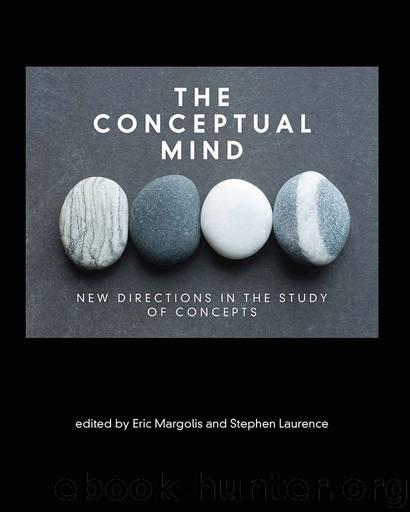The Conceptual Mind: New Directions in the Study of Concepts (MIT Press) by Eric Margolis & Stephen Laurence

Author:Eric Margolis & Stephen Laurence [Margolis, Eric]
Language: eng
Format: epub, azw3
Publisher: The MIT Press
Published: 2015-05-21T22:00:00+00:00
13.3 Reasoning about Biological Kinds
We begin with a small detour. The evidence so far suggests that children have difficulty conceptualizing humans as animals, and, at best, see humans as atypical or unusual members of the animal category. This latter observation seems to imply that the category HUMAN BEING would make a poor base for generalizing (biological) properties to other biological organisms. So, for example, if I told you that humans have some property X and that dogs have some property Y and asked you whether it is more likely that squirrels also have property X or property Y, you might expect most bets to be placed on Y, because X could be some peculiarly human sort of thing. Surprisingly, however, there is a body of research and theory that comes to just the opposite conclusion: that for young children, humans are the prototype or paragon for inductive biological reasoning, and that this human-centered focus is only overturned between five and seven years of age, when children come to reason more like adults, seeing humans as an atypical instance of animal (Carey 1985).
This shift has been interpreted within a domain-specific view of human cognition. A trend in the cognitive and developmental sciences has been a shift from viewing cognition as a domain-general, general-purpose learning and thinking system to seeing cognition as a set of domain-specific mechanisms that are specialized in their processes (Cosmides, Tooby, and Barkow 1992; Medin, Lynch, and Solomon 2000). That is, learning may be guided by certain (possibly innate) skeletal principles, constraints, and assumptions about the world (e.g., R. Gelman 1990; Keil 1981; Spelke 1990). In an important book, Carey (1985) developed a theory of concept learning as built on framework theories that entail ontological commitments in the service of a causal understanding of real-world phenomena.
That’s quite a mouthful; basically it means that different causal principles may operate in different domains. Consider, for example, an event in which a baseball shatters a window. The relevant features and rules underlying our appreciation of the physical aspect of this event (e.g., force mechanics) are quite different from the relevant features and rules that underlie our understanding of the social or psychological aspects of the same event (e.g., blame, responsibility). Developmentalists have argued that (at least) three distinct domains guide children’s development of knowledge: physical processes and events (naïve or folk physics), biological processes and events (naïve or folk biology) and psychological events and processes (naïve or folk psychology).
For Carey (1985, 2009), a key childhood achievement consists of developing a (naïve) biology distinct from naïve psychology. For Western adults who tend to endorse a dualism between mind and body, psychology and biology are distinct domains with distinct causal principles. Eating a candy bar can give someone instant energy, but it will not make them a sweeter person. Carey (1985) argued that (young) children have not yet carved out a domain for biological processes. Instead, biological processes are initially interpreted within the domain of naïve psychology.
That’s a strong claim, and Carey (1985) offered some striking evidence to support it.
Download
The Conceptual Mind: New Directions in the Study of Concepts (MIT Press) by Eric Margolis & Stephen Laurence.azw3
This site does not store any files on its server. We only index and link to content provided by other sites. Please contact the content providers to delete copyright contents if any and email us, we'll remove relevant links or contents immediately.
The Art of Thinking Clearly by Rolf Dobelli(8841)
The 5 Love Languages: The Secret to Love That Lasts by Gary Chapman(8495)
Mindhunter: Inside the FBI's Elite Serial Crime Unit by John E. Douglas & Mark Olshaker(7834)
Becoming Supernatural by Dr. Joe Dispenza(7105)
The Road Less Traveled by M. Scott Peck(6634)
Nudge - Improving Decisions about Health, Wealth, and Happiness by Thaler Sunstein(6633)
Enlightenment Now: The Case for Reason, Science, Humanism, and Progress by Steven Pinker(6405)
Win Bigly by Scott Adams(6311)
Mastermind: How to Think Like Sherlock Holmes by Maria Konnikova(6235)
The Way of Zen by Alan W. Watts(5799)
Factfulness: Ten Reasons We're Wrong About the World – and Why Things Are Better Than You Think by Hans Rosling(4021)
The State of Affairs by Esther Perel(3926)
Gerald's Game by Stephen King(3918)
Man's Search for Meaning by Viktor Frankl(3631)
The Confidence Code by Katty Kay(3566)
Thinking in Bets by Annie Duke(3531)
The Worm at the Core by Sheldon Solomon(2917)
Enlightenment Now by Steven Pinker(2917)
Liar's Poker by Michael Lewis(2811)
